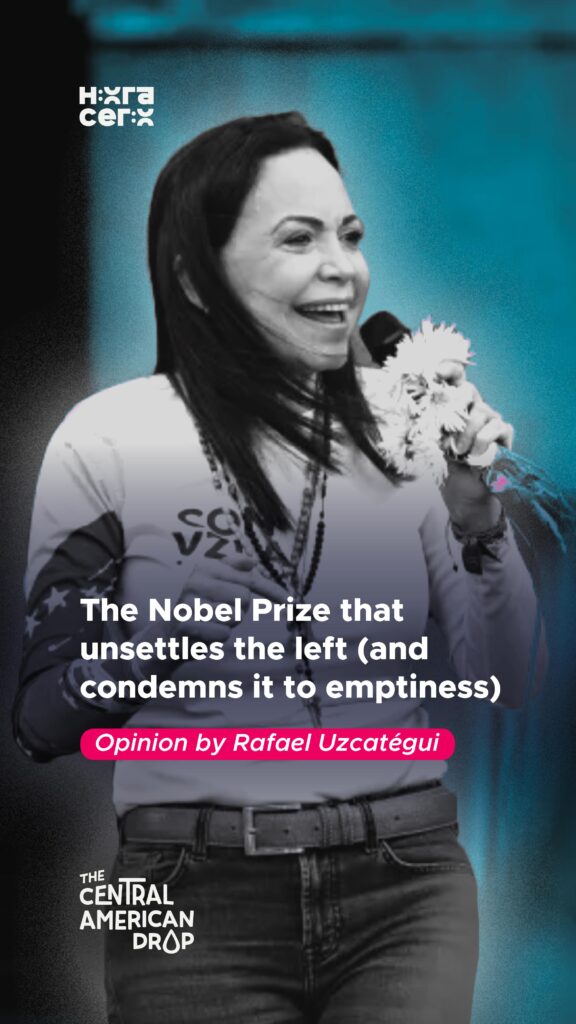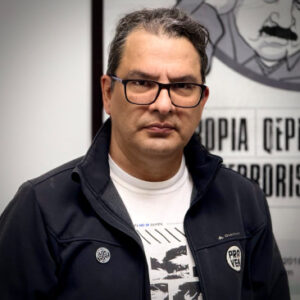
The reactions of much of the international left to the 2025 Nobel Peace Prize awarded to Venezuelan María Corina Machado effectively condemn her to irrelevance in any future process of the country’s democratic re-institutionalization. That space, once occupied by Latin American solidarity, is now being filled by the United States.
Before the Norwegian Peace Committee’s announcement, a friend discarded the rumor that the price would be delivered to Donald Trump for his intervention in Gaza: «It’s an open process that’s just beginning, and we still don’t know what the real results will be.» After Friday, October 10, when it was already public knowledge that the Venezuelan was the winner, I ran into him again. This time he was furious: «María Corina Machado is asking for a military intervention; she doesn’t deserve it.» With all the U.S. president’s shifts and mood swings in his diplomacy of force, this wouldn’t be an «open process that still lacks real results,» but a fait accompli, even though it’s as uncertain as it is improbable that a marine will set foot on Venezuelan soil.
María Corina Machado has been a controversial figure. But anyone who has followed her political career openly must recognize that it is very different from that of 2010, when she barely received 5% of the electorate’s approval rating, which forced her, in a male-dominated political landscape, to take radical stances.
Nominations for the Nobel Peace Prize closed on January 31st. As the verdict clearly states, the five members of the Committee appointed by the Norwegian parliament recognized her leadership in the 2024 presidential elections, a peaceful and nonviolent strategy that forced the Venezuelan authorities to commit the most scandalous fraud in recent history.
(With all the virtues of 28J, I believe that María Corina Machado won the Nobel Prize that was awarded a day later). When witnesses began reading the results at the polling stations — as the opposition’s strategy had designed—a popular truth emerged, contrary to the state truth later announced by the official media. The outrage was enormous, and, especially among the working-class sectors, people spontaneously took to the streets, sparking a national rebellion that even toppled nine statues of Hugo Chávez.
That day, Machado faced all kinds of pressure to encourage protests and call for an assault on the centers of power, including Miraflores. The María Corina of 2010 would likely have called for a «street of no return.» But the leader of Vente Venezuela in 2025 maintained her focus on a peaceful strategy: proving the fraud with the records in hand. Thanks to that decision, instead of the 24 people killed during those days by security forces, we might still be counting the dead today.
Judging a book by its dedication
Personally, I’m uncomfortable with the excessive prominence of the United States in the Venezuelan conflict. But it would be naive to ignore that this space was opened by the voids left by other countries, especially those in Latin America. For years I have tried—unsuccessfully—to get the region’s social movements to show solidarity with the Venezuelan democratic cause.
On the other hand, I also learned that one shouldn’t judge a book only by what its dedication says.
The virulent reactions against the award alone can be interpreted in Venezuela in one way: as a disqualification of all the efforts made, at least in the last decade, to restore democracy. The most recent—and precisely the one recognized by the Nobel Prize—was participating and voting en masse, despite the odds against them.
For many, these reactions amount to indirect support for the government that perpetrated fraud, expelled a third of the population, and is being investigated by the International Criminal Court for crimes against humanity. They are also a sign of support for the more than 800 political prisoners, dozens of whom are being held incommunicado. It’s denying the work that Michelle Bachelet, as United Nations High Commissioner for Human Rights, did to curb abuses. Many who once supported the so-called «Bolivarian revolution» distanced themselves from it not out of shame over its authoritarian tendencies, torture, or forced disappearances, but because Venezuela was no longer fashionable on the catwalk of international progressivism.
Venezuelans feel that the left has abandoned them in their struggle for democracy. Therefore, it is almost impossible for them to identify with their role models or their own imagery, and to conclude that it is precisely this that oppresses them and has forced them to leave their country.
What would have happened if a large part of the international left had been more lucid and better informed about the Venezuelan reality? Let’s speculate some possible consequences:
1) If the international consensus that all critics of Bolivarianism were «right-wing» had not been legitimized, it would have helped weaken polarization, allowing for the expression and consolidation of a democratic opposition to Chavismo with greater ideological diversity, which would have in turn allowed for the organic articulation and open political action of the internal dissidents existing within «21st Century Socialism.»
2) If it hadn’t been uncritically repeated that any social unrest within Chavista Venezuela was created by the United States, it would have allowed both progressive-governed countries and various international social organizations to become a counterweight to the White House’s influence. This sector would have promoted and led forums for pressure and dialogue for a democratic resolution to the conflict following the electoral fraud of June 28th.
3) If the international left had not first given a blank check to Hugo Chávez, and by extension to Nicolás Maduro, it would have become part of the political and social referents of those within the country fighting for a return to democracy, tempering the conservative reaction of a public opinion exhausted by the conflict and desperate for change.
4) If a good part of international progressivism had not remained silent in the face of the most anti-democratic actions of Chavismo it would have raised the political cost of his actions and pressured him to accept alternation in power. This would have even paved the way for him to have a future as a political movement within the country.
5) If international criticism of the rise in human rights violations in Venezuela had not been silenced, perhaps some lives would have been saved—people killed in protests—or the suffering of victims and relatives of political prisoners subjected to torture would have been avoided.
6) If the warnings about the lack of structural measures to combat poverty promoted by the Bolivarian project had been echoed in its international support sectors, the government would have been forced to take measures against inefficiency and corruption. The pressure for the rational use of its income during the so-called decade of the commodities, in which the entire region benefited from high export prices, would have prevented the emergence of a complex humanitarian emergency, and thus the worst forced migration crisis on the continent.
Mandela, another Nobel Prize winner, moved from armed struggle to reconciliation. As a public figure, María Corina Machado can and should be questioned, but for the right reasons. Fake News Hunters, a fact-checking initiative, published an article debunking the main hoaxes that the left repeats about her. The most recurrent is the one that decontextualizes the communication that MCM sent in 2018 to different governments to request action in the UN Security Council. The gullible repeat Jorge Rodríguez’s version that he had recently asked Benjamin Netanyahu “invade Venezuela and kill the Chavistas.”
While revolutionary militants continue to express their irritation at feeling displaced from the imaginary place they believe they occupy in the redemption of humanity, Venezuelans like me will henceforth demand that María Corina Machado live up to the responsibility that comes with being a Nobel Prize winner. It’s much more insightful—and necessary—than bile-fueled opinions.

| Cookie | Duración | Descripción |
|---|---|---|
| cookielawinfo-checkbox-analytics | 11 months | This cookie is set by GDPR Cookie Consent plugin. The cookie is used to store the user consent for the cookies in the category "Analytics". |
| cookielawinfo-checkbox-functional | 11 months | The cookie is set by GDPR cookie consent to record the user consent for the cookies in the category "Functional". |
| cookielawinfo-checkbox-necessary | 11 months | This cookie is set by GDPR Cookie Consent plugin. The cookies is used to store the user consent for the cookies in the category "Necessary". |
| cookielawinfo-checkbox-others | 11 months | This cookie is set by GDPR Cookie Consent plugin. The cookie is used to store the user consent for the cookies in the category "Other. |
| cookielawinfo-checkbox-performance | 11 months | This cookie is set by GDPR Cookie Consent plugin. The cookie is used to store the user consent for the cookies in the category "Performance". |
| viewed_cookie_policy | 11 months | The cookie is set by the GDPR Cookie Consent plugin and is used to store whether or not user has consented to the use of cookies. It does not store any personal data. |